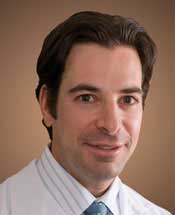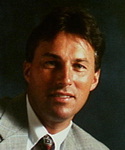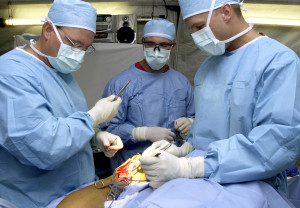This article is reprinted with permission from WABE.
The last patient of the day lies on the operating table of Dr. Kenneth Neufeld. Time to play some hip-hop.
“Oftentimes we change the music at the end of the day to give every one in the room a little bit of an energizing boost just to get through the last case or two,” he says.
Neufeld is a plastic surgeon for eyes at the Thomas Eye Group in Atlanta. On this day, he reconstructed a woman’s eyelid that was destroyed by cancer; removed a metal piece from a little boy’s eye socket after a shooting accident; and performed a few cosmetic eyelid lifts.
No matter how complicated the surgery, he always plays music. Sometimes, he says with a wink, he even plays hip-hop, but his favorite is ’80s pop.
“To me the music in the room is more for the environment,” he says, “to keep everyone involved in patients’ care in good spirits and functioning well, such that we can deal with the surgery efficiently and safely and keep the flow going.”
Specialists and their special tunes
A new research project, jointly conducted by German and American doctors, has found that more than 70 percent of all physicians listen to music in the operating room, via MP3 player or Internet streaming. Music, many doctors say, helps them focus and perform better.
The study, which hasn’t been published yet, also looks at preferences. Dr. Claudius Conrad is one of the lead authors.
“We saw surprising differences,” Conrad says. “And that has to do with the roles of anesthesiologists and surgeons in the operating room.”
Conrad is a liver surgeon at MD Anderson Cancer Center in Houston, Texas. He says anesthesiologists need to monitor alarms and pay attention to acoustic signals.
“We found that anesthesiologists prefer classical music and jazz music, whereas surgeons, their task is very different, a motor performance over prolonged periods of time, and that leads them to need more activating music to have more endurance.”
For Conrad, music and medicine are closely intertwined. Born in Munich, Germany, he holds doctorates in medicine and music philosophy.
At times, the study says there are conflicts between surgeons and anesthesiologists in the OR about the music, be it the genre or the volume.
“Some docs, they play their music really loud. That sometimes is rather a distraction,” says Dr. Marcel Gilli, an anesthesiologist at Piedmont Hospital. “The second thing is, the type of music is not always agreeable to everybody. I’ve even witnessed a surgeon who plays Christmas music in June.”
Born and trained in Switzerland, Gilli has practiced medicine in the United States for 30 years. He says he likes a strict routine in the operating room.
“When I put a patient asleep, I want it to be quiet in the operating room. I don’t want a lot of music, and if it’s music, then just background music.”
When doctors disagree
Gilli says most patients, as they are wheeled into the OR and the medicine kicks in, also prefer softer tunes. Once the patients are out, and during the procedure itself, the music usually doesn’t bother him, he says. And if it does, he asks his colleagues to push the pause button.
“Surgery still is a very serious business,” Gilli says. “You have to be vigilant every single moment.”
Eye surgeon Neufeld agrees. But to him personally, music is not a distraction, even in critical situations. He simply blocks it out.
“To me, sometimes, it’s more like white noise,” he says. “Often times, I lose myself in the surgery, and I have no idea what’s going on with the music on the outside. I’m just intent upon the task at hand, and I focus internally as opposed to exerting a change in the external environment.”
Despite all differences, research shows that in the operating room, music synchronizes the work flow, fosters communication and improves performance. Study author Conrad thinks classical music is a good bonding agent in the OR.
“We have looked at finding an easy common denominator,” he says. “And we found that classical music seems to work the best for most people.”
Whether it’s classical or pop, Christmas carols or hip-hop, the final decision about the music always lies with the surgeon. And so does the responsibility to achieve the best possible outcome for the patients, says Neufeld.
“If the surgeon is frazzled, it trickles down and everyone gets frazzled. And I think a big part of being a surgeon is keeping your composure and keeping everyone else in the room as focused on the task as you can.”
On this day, no one got frazzled in Neufeld’s operating room. The last suture is done, the last song played.
Katja Ridderbusch is an Atlanta-based independent producer for German National Public Radio. She is a senior foreign correspondent for Die Welt and Der Tagesspiegel, as well as Spiegel online. She frequently reports about health care in the U.S.





